|
|
|
Sort Order |
|
|
|
Items / Page
|
|
|
|
|
|
|
| Srl | Item |
| 1 |
ID:
105232


|
|
|
|
|
| Publication |
2011.
|
| Summary/Abstract |
The application of psychological perspectives to international studies (IS) is an area of growing research. This review provides a brief overview of interdisciplinary scholarship on psychology in IS, with a particular description of its application to examining traumatic stress. Psychological variables and methods can help IS to achieve greater explanatory power. Using a variety of methods such as surveys, simulations, and case studies to investigate psychological constructs in the international context can overcome the limitations of relying on any single approach. Several psychological constructs with potential applicability to understanding traumatic stress in particular are discussed to illustrate the application and limitations of psychological perspectives in IS. With so many theories and methods, psychology offers rich future possibilities for novel ways to examine IS.
|
|
|
|
|
|
|
|
|
|
|
|
|
|
|
|
| 2 |
ID:
105240
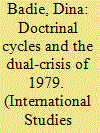

|
|
|
|
|
| Publication |
2011.
|
| Summary/Abstract |
Though presidential doctrines claim to be broad, forward-looking articulations of national security principles, they are in fact reactive and narrow. They emerge following crises and can subsequently constrain security policy, creating ideal conditions for new crises to emerge. This paper thus argues that in the pursuit of security, presidential doctrines can perpetuate a cycle of instability. Using the Nixon Doctrine as the present case study reveals that the strategy first came as a response to the failure in Vietnam, then rendered the US unable to foresee or manage the events of 1979: the Iranian Revolution and the Soviet invasion of Afghanistan. These crises subsequently forced a wholesale reassessment of security in the form of the Carter Doctrine. In examining this period of US-Middle East relations, the constricting, reactive nature of doctrines and the concomitant cycles of instability become self-evident.
|
|
|
|
|
|
|
|
|
|
|
|
|
|
|
|
| 3 |
ID:
105238
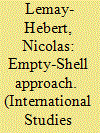

|
|
|
|
|
| Publication |
2011.
|
| Summary/Abstract |
State-building under the aegis of international administrations has faced various hurdles and obstacles in Kosovo and Timor-Leste-failures that came to full light in March 2004 in Kosovo and in May 2006 in Timor-Leste. However, the international conception buttressing the set up of international administrations-I dub it the "empty-shell" approach-is still present in certain policy circles. This article aims to analyze this international conception by clarifying how the UN came to impose its authority over the two territories in a very similar process. While the literature on each state-building experiment is vast and compelling, few authors have attempted to contrast the two case studies, especially regarding the mental conception informing the governance process of these territories since 1999. This article links the empty-shell approach with the delegitimization process that came to be experienced by the UN in both cases. The article describes the international policies put in place by the UN to expand its control over the two territories, a mix of co-option of local elites and the marginalization of the local population. Finally, the article reveals some possible solutions in order to avoid the more blatant difficulties pertaining to state-building conducted from the outside-in.
|
|
|
|
|
|
|
|
|
|
|
|
|
|
|
|
| 4 |
ID:
105231
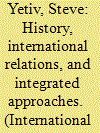

|
|
|
|
|
| Publication |
2011.
|
| Summary/Abstract |
This essay starts by exploring how history can contribute to the discipline of international relations (IR). It then moves beyond this question to explore a broader question, beyond IR and history, with which this symposium is concerned: how can we enhance interdisciplinary analysis in international studies? With regard to the first question, this essay advances several themes. First, while history can serve IR in several ways, it is especially salient to the study of change in IR. Second, the study of history can help us connect the dots across time in ways that can complement IR. Stringing detailed cases together or examining the broader sweep of a longer time period may help us discern causal connections that would have been buried in more streamlined and short-term analyses. Third, history can aid in theory-building, modeling, and testing in the study of IR. Quantitative approaches can also benefit from in-depth historical studies. In assessing the value of history to IR, however, it is critical to ask what type of historians and IR scholars we are considering and to be aware of the differences among them. Fourth, while it is useful to draw on history for IR, history also has its limits and may be misused. At the core, this essay examines how history can contribute to IR, but that analysis raises a broader question: how can we integrate notions and insights from various disciplines in international studies, including history and IR? This essay advances one schema for doing so, which it calls "integrated approaches." It demonstrates one type of integrated approach for the study of foreign policy behavior. The approach systematically draws on multiple disciplines to explain behaviors such as decisions to make treaties, go to war, or ally with other countries.
|
|
|
|
|
|
|
|
|
|
|
|
|
|
|
|
| 5 |
ID:
105233
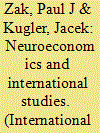

|
|
|
|
|
| Publication |
2011.
|
| Summary/Abstract |
Nearly all political choices depend on trust-or a lack thereof. In world politics, successful negotiations, arms agreements, and deterrence postures all depend on trust. This paper reviews recent findings in neuroeconomics that have identified the neuroactive hormone oxytocin as a key brain mechanism that causes people to trust strangers. This research has also identified the physiologic and behavioral effect of distrust. A neurologically informed formal model of trust is introduced and implications are drawn from it for international studies (IS). We contend that findings in neuroscience and neuroeconomics can be used by social scientists to deepen their understanding of processes such as foreign policy decision making.
|
|
|
|
|
|
|
|
|
|
|
|
|
|
|
|
| 6 |
ID:
105234


|
|
|
|
|
| Publication |
2011.
|
| Summary/Abstract |
The centrality of military coercion in contemporary Western crisis and conflict management constitutes a major policy problem because the United States and its allies are poor at translating their overwhelming military superiority into adversary compliance. The standard explanation provided by coercion theorists is that coercion is hard and that miscalculation, misperception, or practical problems can defeat even a perfectly executed strategy. What they ignore is that the problem also stems from the limits of coercion theory, which has left us with an unnecessarily poor understanding of how military coercion works and how the practical problems involved could be addressed. Our understanding of military coercion would be increased markedly if only coercion theorists would make a greater efforts to do three things, namely (1) provide clear operational definitions of key concepts and variables, (2) engage in systematic and rigorous empirical analysis of generally accepted propositions, and (3) seek to provide solutions to the many policy problems that coercion theorists have identified to date. These simple steps would enhance the degree of cumulativity within the field, provide the principal theoretical propositions with a firmer empirical foundation and make military coercion theory more useful for policy makers.
|
|
|
|
|
|
|
|
|
|
|
|
|
|
|
|
| 7 |
ID:
105230
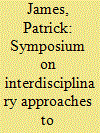

|
|
|
|
|
| Publication |
2011.
|
| Summary/Abstract |
This symposium focuses on application of an integrated approach toward bringing together insights from respective disciplines and interdisciplinary fields to move International Studies (IS) forward. History and psychology, disciplines with an established connection to IS, are explored. Interdisciplinary fields with limited linkages to IS, referring to technology studies and neuroeconomics, also are probed for potential contributions. The introductory essay summarizes how contributions from the preceding disciplines and interdisciplinary fields are identified by the symposium's essays within an integrated approach.
|
|
|
|
|
|
|
|
|
|
|
|
|
|
|
|
| 8 |
ID:
105236
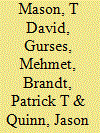

|
|
|
|
|
| Publication |
2011.
|
| Summary/Abstract |
We argue that the duration of the peace after civil wars is mainly a function of the extent to which the outcome of the previous civil war preserved a condition of multiple sovereignty and the extent to which the post-civil war environment creates incentives for dissident groups to resort to violence rather than sustain the peace. Hazard models suggest that the outcome of the previous conflict does affect the duration of the peace, and this effect varies across time. The introduction of peacekeeping forces has a substantial positive effect on peace duration. We also find evidence of a curvilinear relationship between ethnic fractionalization and post-civil war peace duration. Based on these results, we conclude with recommendations for how peace can be maintained after a civil war.
|
|
|
|
|
|
|
|
|
|
|
|
|
|
|
|
|
|
|
|
|